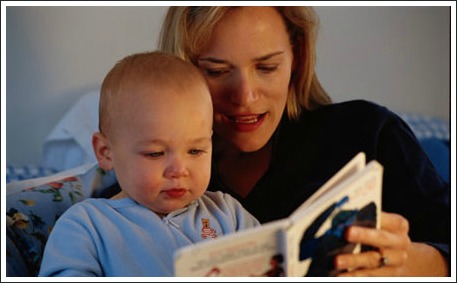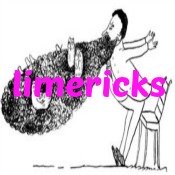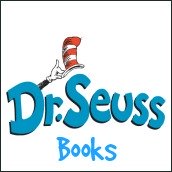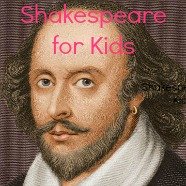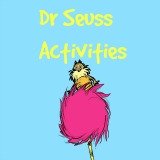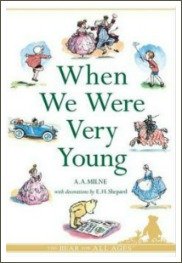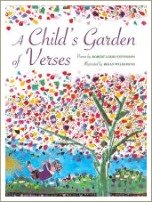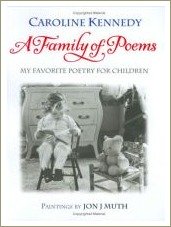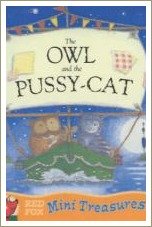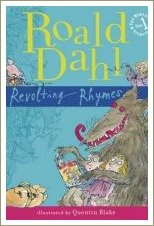You are here: home / kids' poetry / kids' poems: ages and stages
Kids' Poems: Ages and Stages
Are you wondering where to find the best kids' poems and how to get started with sharing them with your children?
On this page you'll learn about which poems are best to share with babies and children at various ages, where to find them and how to get started.
But first: why is it important to share poetry with babies and children?
My experiences as a parent and as a teacher have convinced me that babies and small children know what they need to develop into intelligent, kind, confident human beings and that they show us what they need every day. The fact that little ones love hearing poems and rhymes and playing games with words is proof to me that these things are important for their healthy cognitive and emotional development.
And the research agrees. It shows that hearing poems and rhymes from their earliest days helps children develop three really critical pre-reading and communication skills:
You can read more about why poetry is important for children here.
4 Ages and Stages of Kids' Poems
Different types of poetry appeal to children at different ages and, of course, there's lots of overlap. The poems you read to your baby may well be those he or she loves as a toddler too.
Here's a guide to help you work out where to start, depending on the age of your child. Remember, though, that this is a guide only. Feel free to mess with it and do your own thing!
1. Newborns to about 5 months
When a baby is very young, it doesn't matter very much what kind of poems you read. At this stage your baby is simply listening to the sound and rhythm of your voice as you read. He or she doesn't understand the words, can't sit up very well and can't turn the pages or even (when he's very young) see the pages very well.
Bottom line? Read whatever poetry you like.
If you're a poetry lover, this is a perfect time to read your favourite poems to your baby. Otherwise, spend a bit of time looking for some poems that appeal to you.
If you're not already a huge poetry fan but you do like Banjo Paterson's bush poetry, why not try reading some of his poems to your baby? They have a great rhythm and are lovely to read. Try The Man from Snowy River or my favourite Clancy of the Overflow.
2. About 6 months - 18 months
This is a great age for some of the traditional, short poems written for children by authors like Robert Louis Stevenson and A A Milne. If your baby hasn't already been given them as gifts, I'd suggest buying these two books of children's poetry:
A Child's Garden of Verses
When We Were Very Young
Add to these a big book of nursery rhymes and songs and your baby has a wonderful collection of poetry to take him through his first four years. Read from these books every day, a little bit here and there, and you'll be giving your child an amazing gift. You probably won't start to see the results until he begins to talk but trust me, you will see the results.
As your baby gets older and closer to his first birthday, he may temporarily lose interest in having you read poetry to him. At this age babies are very busy. They're always on the move and not at all keen on sitting still. If this happens with your baby, you may like to put the poetry books away for a while and concentrate on nursery rhymes. Littlies love nursery songs and rhymes at this age because they're fairly short and they often have actions and/or can be sung. This suits their attention span and their need for action!
3. About 18 months - 3 years
At around 18 months of age - and certainly as he gets closer to his second birthday - your baby will start to enjoy stories more. This is a good age to shift your focus to stories which are written in rhyme.
There are lots of beautiful rhyming picture books written for this age group precisely because toddlers enjoy rhyme and rhythmic language and because it's important for them to be exposed to it. My favourites are the Dr Seuss books, anything by Mem Fox (who wrote Possum Magic and Where Is the Green Sheep? ) and the wonderful Hairy MacLary books by New Zealand author Lynley Dodd.
All of these books are lovely to read aloud to younger babies but really come into their own with children aged from about 18 months to three or four years of age. I always think the measure of a really good children's books is how enjoyable it is for the grown-up to read and these are all brilliant to read! They were firm favourites with my own three children (now all teenagers) and we all have very happy memories of reading them together.
4. About 4 - 6 years
Humour is a big hit with this age group so limericks (the clean kind!) go down well. Nonsense poems are also fun to share.
Here are three pages where you'll find free poems to share with this age group:
funny limericks
nonsense rhymes
funny poemsRoald Dahl's Revolting Rhymes are also fun at this age.
children's poetry books short rhyming poems why poetry is important
